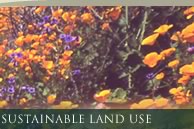Wildlife Conservation Board stops loss of ecological reserve
With EHL leadership, an important precedent for the integrity of public lands was set when a proposed land exchange in San Diego that would have converted state ecological reserve to suburban housing was denied.
The story goes back to1992, when the County of San Diego approved the massive Otay Ranch development, a biological debacle that EHL testified against at the time. Then, in 1996, as a result of negotiations for the Multiple Species Conservation Program (MSCP), three development parcels in the biologically rich Proctor Valley portion of the property were re-planned as MSCP preserve. Later, in 2003, the Wildlife Conservation Board (WCB), the acquisition arm of the Department of Fish and Wildlife (CDFW), spent $22,738,000 to purchase other parcels in Proctor Valley for the “permanent protection” of rare and endangered species. Federal funds were combined with state park bond funds. The acquired lands were added to the Rancho Jamul Ecological Reserve.
Yet, in 2019, the County of San Diego approved the three parcels previously called out for preservation for sprawl development, in spite of letters from the state and federal wildlife agencies that this would violate the MSCP. But under intense pressure from the County of San Diego and the developer, these agencies agreed to resolve the dispute over the fate of the land through an amendment to the MSCP. This resolution rewarded the County and the developer for their non-compliance. Specifically, CDFW and the US Fish and Wildlife Service (USFWS) agreed to exchange Ecological Reserve land that was supposedly protected––land of high value for the endangered Quino checkerspot butterfly––for other state lands of lower biological value. In 2020, the County approved an amended project incorporating the exchange, meaning that Ecological Reserve would be converted to suburban housing. This outcome was a financial windfall for the developer.
In order to justify the exchange, CDFW had to circumvent safeguards built into state law and also ignore its own guidelines that prohibit the conversion endangered species habitat. Lands already protected by the MSCP were falsely counted as benefits. No prior exchange of land done by WCB remotely resembled this one.
Thirty-six conservation groups and twenty-seven land trusts from up and down California signed letters of opposition, an effort organized by EHL and its allies, including Defenders of Wildlife. According to the land trusts, “Approval of the proposed exchange would undermine the confidence of our organizations and the public that lands acquired and designated for conservation by the state will be permanently protected.”
At a final WCB hearing in December 2020, dozens of speakers, from land trusts to biologists to former wildlife agency officials, testified against the exchange. EHL also furnished comprehensive legal and biological analyses. Focusing on the terrible precedent that the exchange would set for protected public land, Board Members voted 5:1 against it.
With the demise of the amended project as approved in 2020, the original non-compliant approval from 2019 is in effect. EHL has filed litigation against that project but it will now be possible for a newly elected and more environmentally conscious Board of Supervisors to revisit the MSCP issue. EHL pledges to work with all parties on constructive solutions. But for now, we have set a positive precedent for the State keeping its promises to the public and maintaining the permanence of public lands.


